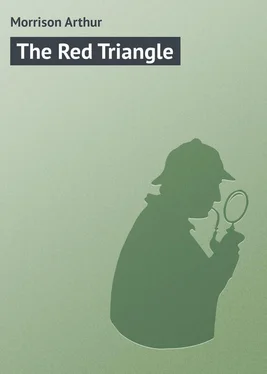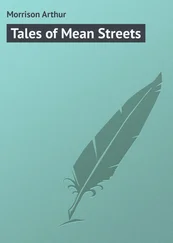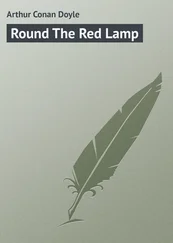Arthur Morrison - The Red Triangle
Здесь есть возможность читать онлайн «Arthur Morrison - The Red Triangle» — ознакомительный отрывок электронной книги совершенно бесплатно, а после прочтения отрывка купить полную версию. В некоторых случаях можно слушать аудио, скачать через торрент в формате fb2 и присутствует краткое содержание. Жанр: Классический детектив, foreign_detective, foreign_prose, foreign_language, на английском языке. Описание произведения, (предисловие) а так же отзывы посетителей доступны на портале библиотеки ЛибКат.
- Название:The Red Triangle
- Автор:
- Жанр:
- Год:неизвестен
- ISBN:нет данных
- Рейтинг книги:3 / 5. Голосов: 1
-
Избранное:Добавить в избранное
- Отзывы:
-
Ваша оценка:
- 60
- 1
- 2
- 3
- 4
- 5
The Red Triangle: краткое содержание, описание и аннотация
Предлагаем к чтению аннотацию, описание, краткое содержание или предисловие (зависит от того, что написал сам автор книги «The Red Triangle»). Если вы не нашли необходимую информацию о книге — напишите в комментариях, мы постараемся отыскать её.
The Red Triangle — читать онлайн ознакомительный отрывок
Ниже представлен текст книги, разбитый по страницам. Система сохранения места последней прочитанной страницы, позволяет с удобством читать онлайн бесплатно книгу «The Red Triangle», без необходимости каждый раз заново искать на чём Вы остановились. Поставьте закладку, и сможете в любой момент перейти на страницу, на которой закончили чтение.
Интервал:
Закладка:
Morrison Arthur
The Red Triangle / Being Some Further Chronicles of Martin Hewitt, Investigator
THE AFFAIR OF SAMUEL'S DIAMONDS
I
I have already recorded many of the adventures of my friend Martin Hewitt, but among them there have been more of a certain few which were discovered to be related together in a very extraordinary manner; and it is to these that I am now at liberty to address myself. There may have been others – cases which gave no indication of their connection with these; some of them indeed I may have told without a suspicion of their connection with the Red Triangle; but the first in which that singular accompaniment became apparent was the matter of Samuel's diamonds. The case exhibited many interesting features, and I was very anxious to report it, with perhaps even less delay than I had thought judicious in other cases; but Hewitt restrained me.
"No, Brett," he said, "there is more to come of this. This particular case is over, it is true, but there is much behind. I've an idea that I shall see that Red Triangle again. I may, or, of course, I may not; but there is deep work going on – very deep work, and whether we see more of it or not, I must keep prepared. I can't afford to throw a single card upon the table. So, as many notes as you please, Brett, for future reference; but no publication yet – none of your journalism!"
Hewitt was right. It was not so long before we heard more of the Red Triangle, and after that more, though the true connection of some of the cases with the mysterious symbol and the meaning of the symbol itself remained for a time undiscovered. But at last Hewitt was able to unmask the hideous secret, and for ever put an end to the evil influence that gathered about the sign; and now there remains no reason why the full story should not be told.
I have told elsewhere of my first acquaintance with Martin Hewitt, of his pleasant and companionable nature, his ordinary height, his stoutness, his round, smiling face – those characteristics that aided him so well in his business of investigator, so unlike was his appearance and manner to that of the private detective of the ordinary person's imagination. Therefore I need only remind my readers that my bachelor chambers were, during most of my acquaintance with Hewitt, in the old building near the Strand, in which Hewitt's office stood at the top of the first flight of stairs; where the plain ground-glass of the door bore as inscription the single word "Hewitt," and the sharp lad, Kerrett, first received visitors in the outer office.
Next door to this old house, at the time I am to speak of, a much newer building stood, especially built for letting out in offices. It happened that one day as Hewitt left his office for a late lunch, he became aware of a pallid and agitated Jew who was pervading the front door of this adjoining building. The man exhibited every sign of nervous expectancy, staring this way and that up and down the busy street, and once or twice rushing aimlessly half-way up the inner stairs, and as often returning to the door. Apprehension was plain on his pale face, and he was clearly in a state that blinded his attention to the ordinary matters about him, just as happens when a man is in momentary and nervous expectation of some serious event.
Noting these things as he passed, with no more than the observation that was his professional habit, Hewitt proceeded to his lunch. This done with, he returned to his office, perceiving, as he passed the next-door building, that the distracted Jew was no longer visible. It seemed plain that the person or the event he had awaited with such obvious nervousness had arrived and passed; one more of the problems, anxieties or crises that join and unravel moment by moment in the human ant-hill of London, had perhaps closed for good or ill within the past half-hour; perhaps it had only begun.
A message awaited Hewitt at his office – an urgent message. The housekeeper had come in from next door, Kerrett reported, with an urgent request that Mr. Martin Hewitt would go immediately to the offices of Mr. Denson, on the third floor. The housekeeper seemed to know little or nothing of the business, except that a Mr. Samuel was alone in Mr. Denson's office, and had sent the message.
With no delay Hewitt transferred himself to the next-door offices. There the housekeeper, who inhabited a uniform and a glass box opposite the foot of the first flight of stairs, directed Hewitt, with the remark that the gentleman was very impatient and very much upset. "Third floor, sir, second door on the right; name Denson on the door. There's no lift."
"W.F. Denson" was the complete name, followed by the line "Foreign and Commission Agent." This Hewitt read with some little difficulty, for the door was open, and on the threshold stood that same agitated Jew whom Hewitt had seen at the front door.
A little less actively perturbed now, he was nevertheless still nervously pale. "Mr. Martin Hewitt?" he cried, while Hewitt was still only at the head of the stairs. "Is it Mr. Martin Hewitt?"
Hewitt came quietly along the corridor, using eyes and ears as he came. The Jew was a man of middle height, very obviously Jewish, and with a slight accent that hinted a Continental origin.
"I have just received your message," Hewitt said, "and, as you see, I am here with no delay. Is Mr. Denson in?"
"No – good heafens no – I would gif anything if he was, Mr. Hewitt. Come in, do! I haf been robbed – robbed by Denson himself, wit'out a wort of doubt. It is terrible – terrible! Fifteen t'ousant pounds! It ruins me, Mr. Hewitt, ruins me! Unless you can recover it! If you recover it, I will pay – pay – oh, I will pay fery well indeed!"
There was a characteristically sudden moderation of the client's emphasis when he came to the engagement to pay. Hewitt had observed it in other clients, but it did not disturb him.
"First," he said, "you must tell me your difficulty. You say you have been robbed of fifteen thousand pounds – "
"Tiamonts, Mr. Hewitt – tiamonts! All from the case – here is the case, empty – "
"Let us be methodical. We will shut the door and sit down." Hewitt pressed his client into a chair and produced his note-book. "It will be better to begin at the beginning. First, I should like to know your name, and a few such particulars as that."
"Lewis Samuel, Hatton Garden – 150, Hatton Garden – tiamont merchant."
"Yes. And what is your connection with Mr. Denson?"
"Business – just business," Samuel responded. He pronounced it "pishness," and it seemed his favourite word. "Like this; I will tell you. I haf known him some time, and did at first small pishness. He bought a little tiamont and haf it set in pracelet, and he pay – straightforward pishness. Then he bought some very good paste stones, all set in gold, and he pay – quite straightforward pishness. At the same time he says, 'I am pishness man myself, Mr. Samuel,' he says, 'and I like to make a little moneys as well as pay out sometimes. Don't you want any little agencies done? I do all foreign commissions, and I can forwart and receive and clear at dock and custom house. If you send any tiamonts I can consign and insure – very cheapest rates to you, special. If you want brokerage or buy and sell for you, confidential, I can do it with lowest commission. Especially I haf good connection with America. I haf many rich Americans, principals and customers,' he says, 'and often I could do pishness for you when they come over.'"
"By which he meant he might sell them diamonds?" Hewitt queried.
"Just so, Mr. Hewitt – reg'lar pishness. And after that two or three little parcels of tiamonts he bought – for American customers, he says. But he says he can do bigger pishness soon. Ay, so he has – goot heavens, he has! But I tell you. I do also one or two small pishnesses with him, and that is all right – he treat me very well and I pay when it suits. Then he says, 'Samuel,' he says, very friendly now inteet, 'Samuel, could you get a nice large lot of tiamonts for an American customer I expect here soon?' And I say, 'Of course I can.' 'Enough,' he says, 'to fit out a rich man's wife – that is, to pegin. He is not long rich, and he will want more soon – ah, she will make him pay! But to pegin – a good fit-out of tiamonts, eh?'
Читать дальшеИнтервал:
Закладка:
Похожие книги на «The Red Triangle»
Представляем Вашему вниманию похожие книги на «The Red Triangle» списком для выбора. Мы отобрали схожую по названию и смыслу литературу в надежде предоставить читателям больше вариантов отыскать новые, интересные, ещё непрочитанные произведения.
Обсуждение, отзывы о книге «The Red Triangle» и просто собственные мнения читателей. Оставьте ваши комментарии, напишите, что Вы думаете о произведении, его смысле или главных героях. Укажите что конкретно понравилось, а что нет, и почему Вы так считаете.












